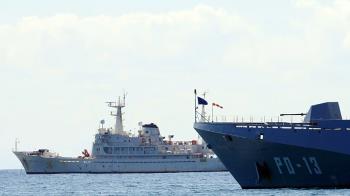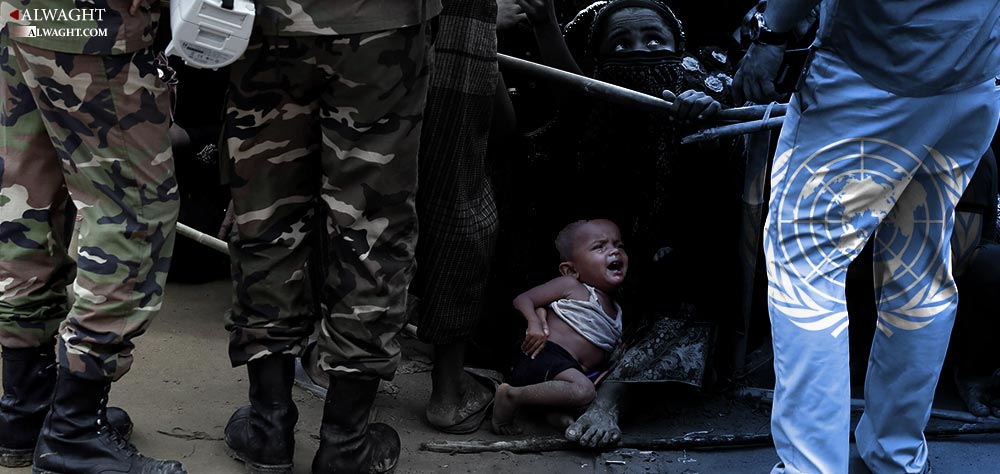Alwaght-The Myanmar regime is continuing its "ethnic cleansing" of Rohingya, having shifted to a “lower intensity campaign of terror and forced starvation,” according to a UN human rights envoy.
“The ethnic cleansing of Rohingya from Myanmar continues. I don’t think we can draw any other conclusion from what I have seen and heard in Cox’s Bazar,” Andrew Gilmour, the UN Assistant Secretary-General for Human Rights, said at the end of a four-day visit to Bangladesh which is hosting more than 800,000 Rohingya refugees, most of whom fled Myanmar this past August in the wake of a crackdown by the country's security forces.
According to the Office of the UN High Commissioner for Human Rights (OHCHR), a number of refugees told Mr. Gilmour that Rohingyas Muslims who try to leave their villages or even their homes “are taken away and never return.”
They recounted incidents where family members were taken away by Myanmar’s security forces and later found dead. Furthermore, people are too afraid to ask what happened – or in cases where they question or protest, are beaten badly.
Widespread, systematic violence
“It appears that widespread and systematic violence against the Rohingya persists,” added Mr. Gilmour, noting that the nature of the violence “has changed from the frenzied blood-letting and mass rape of last year to a lower intensity campaign of terror and forced starvation that seems to be designed to drive the remaining Rohingya from their homes and into Bangladesh.”
The senior UN human rights official also warned that while the Government of Myanmar is “busy telling” the international community that it is ready to receive Rohingya returnees, its forces are continuing to drive them away into Bangladesh.
“Safe, dignified and sustainable returns are of course impossible under current conditions,” stressed Mr. Gilmour.
Inconceivable for refugees to return
He underlined that it is inconceivable to expect refugees to return given the immediate threat of almost certain killings, rape and other forms of violence; the impossibility of living at the places of origin, given that all sources of food and livelihood have been destroyed or declared off-limits for most of the remaining Rohingya; and the apparent absence of any will to address the root causes of the violence, which has resulted from decades-long policies of discrimination against the Rohingya, particularly the refusal of Myanmar authorities to recognize their right to self-identification and to grant them citizenship.
While in Cox’s Bazar – once a sleepy fishing town in southern Bangladesh that has now transformed into the world’s largest refugee camp – Mr. Gilmour also drew attention to the fragile living conditions and the threats posed by upcoming, potentially devastating, rains.
Genocide
Meanwhile, The United Nations human rights chief said on Wednesday he strongly suspected that “acts of genocide” may have taken place against Muslim Rohingyas in Myanmar’s northern Rakhine state since August.
Zeid Ra’ad al-Hussein said in a speech to the U.N. Human Rights Council that reports of bulldozing of alleged mass graves showed a “deliberate attempt by the authorities to destroy evidence of potential international crimes, including possible crimes against humanity.”
The United Nations defines genocide as acts meant to destroy a national, ethnic, racial or religious group in whole or in part.
Ethnic cleansing and genocide are very similar concepts that refer to the killing and destruction of entire populations. Additionally, “genocide” is recognized as an independent crime under international law – and it is regulated by various treaties and conventions, including the Convention on the Prevention and Punishment of the Crime of Genocide (1948) – while “ethnic cleansing” – despite being condemned – is not recognized as an independent crime.
Rohingya Muslims, most persecuted in the world
The Rohingya Muslims, one of the most persecuted communities in the world, are not recognized as citizens of Myanmar and face widespread discrimination from the authorities.
Prior to the current exodus, tens of thousands of Rohingya have already been living as refugees in several neighboring countries.
The plight of the Rohingya reached its peak in Myanmar six months ago when the country's military assisted by extremist Buddhists cracked down on the minority group in Rakhine State, sparking a mass exodus.
Doctors Without Borders (known by its French acronym, MSF) has estimated that at least 6,700 Rohingya were killed in the first month of the current crackdown alone.
Hundreds of Rohingya villages were torched, and recent satellite imagery showed at least 55 villages have since been completely bulldozed, removing all traces of buildings, wells and vegetation.



























